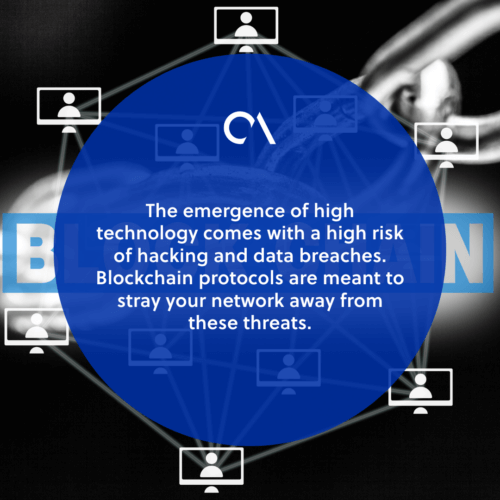Blockchain protocols and their role in security

Technology is continuously expanding and evolving. With unlimited knowledge and resources, inventions are becoming more high-tech and beneficial to society as days pass.
However, the fast progress of automation and computers also comes with a quick way to jeopardize everything.
Blockchain protocols are here to prevent it. From the infinite data provided by Internet users to intangible investments like cryptocurrencies, a tight security system should be applied for the protection of these intel.
The rise of cryptocurrency
Cryptocurrency acts both as a payment method and investment. Its value depends on how the global economy is doing, as it can be traded, mined, and burned.
In other words, it can increase and decrease depending on the supply and demand chain.
In 2009, Bitcoin was considered to be the first cryptocurrency to be invented and made public.
Although never traded and only mined, this cryptocurrency boomed so well that currently, its first investors are now millionaires.
Today, there are various cryptocurrencies available in the market.
These big value cryptocurrencies are what blockchain protocol protects.
Given their high value and increasing demand, they are prone to ransomware and endanger the privacy of investors.
The rise of cryptocurrency marks a paradigm shift in the financial landscape where traditional banking systems are being challenged by decentralized network.
All about blockchain protocols
A blockchain protocol acts as a general safety feature to protect all data, transactions, and finance involved in cryptocurrencies.
Blockchain protocols are the cornerstone of blockchain technology. They are the set of rules defining the structure and interactions within a blockchain network.

Blockchain protocols are not limited to cryptocurrency itself. They can also be seen in other web-based services, such as emails.
Emails are protected to deliver messages and concerns through numerous sets of protocols.
What makes blockchain protocols important is its ability to decentralize cryptocurrencies.
The loss of a central hub or authority in a computer influences a trustless work environment among members, which is beneficial when a company wants to retain a secure and protected network.
Five components of blockchain protocols
Just as hypertext transfer protocol (HTTP) controls internet communication, blockchain protocols are essential for transparency, immutability, and decentralization in the digital world.
Hyperledger
Released in 2015, Hyperledger was launched as an open-source enterprise framework.
It focuses on a permissioned blockchain while allowing any member with expertise to contribute.
Since it is a large network developed from different frameworks and protocols, Hyperledger provides a universal guideline for blockchain implementation for enterprise solutions.
Corda
Similar to Hyperledger, Corda also offers an enterprise-focused protocol and is open-sourced.
This blockchain utilizes consensus algorithms to provide transparency and validation of transactions to members.
Attaining accreditation from R3, a banking consortium, most of its users come from the financial and banking industries.
Multichain
Unlike Corda, this type of technology provides a private blockchain for the financial transactions of a business.
Multichain aims to keep the blockchain privately within members to safeguard the listed transactions and provide integral stability in the network.
With this protocol opting to go private, the blockchain can only permit transactions that are done by verified members.
Quorum
Quorum is an Ethereum-based blockchain that started out as a project by the now giant cryptocurrency.
When it was first developed, the sole goal of this blockchain was to provide transaction support and privacy among Ethereum’s sharers.
However, it has now expanded to address the concerns of network management, consensus voting implementation, and better performance.
Quorum is also a well-utilized protocol present in financial institutions.
Enterprise Ethereum
Ethereum is one of the biggest cryptocurrencies worldwide. It is also a public blockchain and offers several features, such as smart contracts and dApp development.
With this, the company developed a new blockchain specifically designed for businesses: Enterprise Ethereum.
This is a private and permission-based technology to ensure a business’ security in conducting transactions.
Must know blockchain protocol
Protocols play a crucial role in determining the rules and processes that validate transactions on a blockchain platform.
Distributed Ledgers
Distributed ledgers are essentially databases synchronized and shared across different sites, demographics, and institutions.
It allows transactions to be made public, reproduced, and reshared on numerous websites within seconds. A blockchain is a type of distributed ledger.
Smart Contracts
When information is stored on a blockchain, smart contracts do the job of sharing it with different networks.
These are transaction protocols that automatically execute and document events according to agreed conditions by all parties involved.
Coins and Tokens
A blockchain protocol requires digital assets to function, and that is the role of coins and tokens.
Mainly acting as an incentive to the people behind blockchain management, it also represents a person’s share or ownership percentage for some cryptocurrencies.
Their roles are essentially similar, but coins are considered more fundamental in blockchain protocols, while tokens are more high-level and controlled by smart contracts.
51% Attack
51% attack is a concept occurring in cryptocurrencies when a member gains control of more than 50% of the network.
This can be done as a huge section of cryptocurrency projects depend on anonymous members voting to meet a consensus.
The number of coins owned by each member decides their power in these voting arrangements.
This blockchain protocol is vulnerable to members with agendas to engage in overspending and alter a network. It can also be risky to uphold a project’s reputation.
Consensus Algorithm
A consensus algorithm is used to achieve an agreement on a network to verify processes and transactions.
Designed to attain reliability and trust among nodes, it is often applied in a blockchain for further security.
Secure your network with blockchain protocols
The emergence of high technology comes with a high risk of hacking and data breaches.
Blockchain protocols are meant to keep your network away from these threats.
These protocols determine how data is structured and stored within a peer-to-peer network, ensuring transparency and immutability.

When building a business that is highly present on the Internet, it is important to secure your network with these safety features.
The renowned Bitcoin protocol, for instance, revolutionized digital transactions by enabling secure payments without the need for a central authority.







 Independent
Independent




